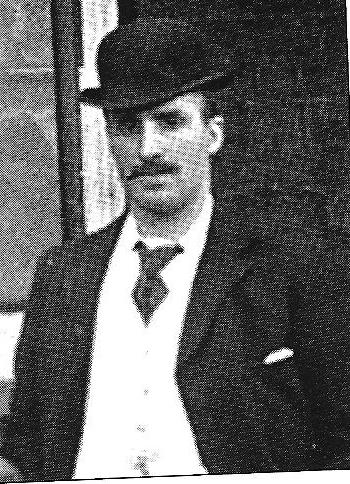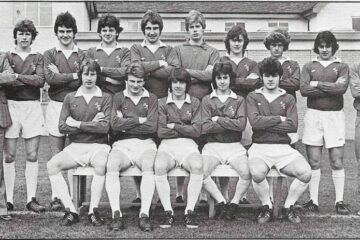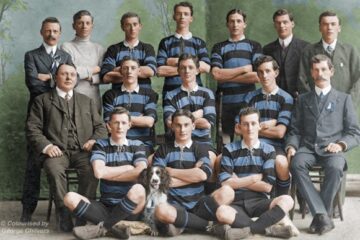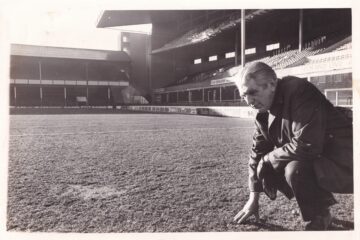When Everton began their first season at Goodison Park, they needed cover in the position of goalkeeper due to the tragic loss of John Angus following their Championship success at Anfield. Overtures were made to the Scottish international at the time, Jim Wilson, but he could not be lured away from his position at Vale of Leven. So Everton invited Stoke player William Rowley to join them on a visit to Scotland.
Born in November 1865 in the Potteries town of Hanley, he was the child of Charles, a clerk, and his wife Sarah. By 1871 however, Sarah was no longer alive and William, along with his father, was living at the home of his grandparents in Hanley. By 1881 he’d moved in with his aunt and his cousins and had begun to work as a potter. Around 1884 he joined Burslam Port Vale and was quickly chosen to play representative matches for Staffordshire. The following season he took part in the club’s inaugural FA Cup campaign, which saw them having to withdraw when faced with an expensive replayed game against Essex-based Brentwood. Rowley then caused controversy when, unbeknown to the Burslam side, he joined neighbours Stoke, which resulted in a court case and led to his new club having to pay a fine amounting to £5. Both sides applied for membership of the Football League, but it was Stoke who were successful.
On 8 September 1888, Bill Rowley took part in the first league game played on the Victoria Ground where Stoke were beaten 2-0 by Staffordshire neighbours, West Bromwich Albion. On 12 January 1889, he appeared at Anfield where the visitors lost 2-1. The return game, however, was to prove most unusual.
The Victoria ground was shrouded in thick fog when play commenced in front of 2,000 spectators. As the game progressed, darkness began to fall, and the referee, with the score standing at 0-0, blew his whistle and ended the game after seventy-five minutes. He later explained that he did so because he could not distinguish all aspects of play. The match was never replayed. Stoke continued to struggle in the Football League but the excellent goalkeeping shown by Rowley resulted in him being selected to play for England.
The game took place on 9 March at Anfield and Ireland were the visitors. It was the second time the national side had appeared in Liverpool and over 6,000 people attended the match. Rowley had an easy debut, as England won by six goals to one. His next visit to Anfield, however, was to prove a most painful experience. The Potters were again propping up the table when they arrived in Liverpool on 2 November 1889 to play an Everton side that had now been reinforced with imported players from Scotland. Stoke lost the game 8-0. However, Bill Rowley and his team mates later knocked Everton out of the FA Cup in what was to be their high spot of the season, as they again finished bottom of the table.

On 10 September 1892, William Rowley made a guest appearance for Everton against Heart of Midlothian at Tynecastle Park. The warm, sunny evening encouraged a crowd of around 10,000 people to attend the match that Everton won by three goals to nil. There is no record of Everton then attempting to sign Rowley, but instead they gave an unsuccessful trial to Henry Jardine, who was the younger brother of David Jardine, the current goalkeeper. Several other players in this position we trialled, before finally settling on Richard Williams.
In the meantime, Billy Rowley completed the season with Stoke and made one more appearance for England. During the summer he married Ellen Rhodes and the couple set up home at Longton where they started to raise a family.
Everton, meanwhile, hadnt given up their pursuit of Rowley. The club Minute Book records the entry on 16 May 1894; ‘W. Rowley to be engaged, provided he passes our doctor, for 2 years at 70 shillings per week”. However, the move was never completed, and by the following October, the club had signed the Stoke reserve team goalkeeper, Thomas Cain.
On official records, such as census returns, William Rowley never declared himself as a full-time professional footballer and preferred to decribe himself as working in the pottery industry. Despite his reticence, he went on to make 124 appearances for Stoke and had become club secretary when he negotiated the terms of his own transfer to Football League Division Two side Leicester Fosse in 1896. Rowley had played one game for his new club, claiming to be an amateur, when the FA Committee, who did not take kindly to the transfer arrangements, suspended him from the game for one season. The 1911 census shows the family were still living at their original address in Longton, but Ellen died later that year. William Rowley lived as a widower, until his death at Stoke-on-Trent in March 1934.



